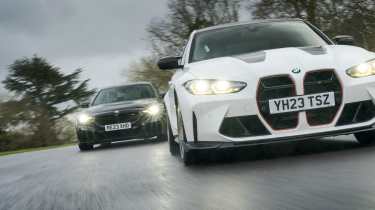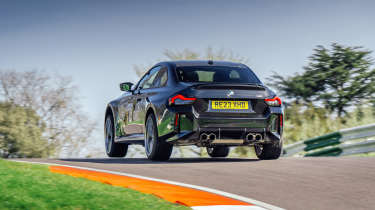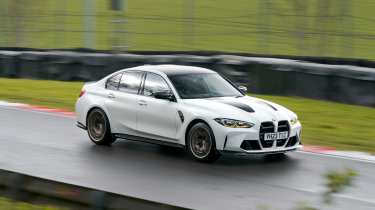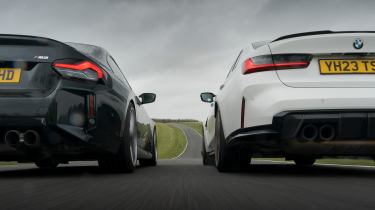BMW M3 CS v Litchfield BMW M2: which makes the better track car?
BMW's latest and greatest M3 takes on Litchfield's 640bhp tuned M2 around Cadwell Park
The normal laws of mathematics don’t seem to apply to either of these cars. There are numbers associated with both of them which are mildly head-scrambling.
One of them is 640bhp, the M2’s power output. It’s been fettled by Litchfield Motors, as the Tewkesbury tuning specialist turns its attention to the new G87-series M2. As with so many other performance cars, from Alpines to McLarens to Nissan GTRs to Porsches and many more (including the previous-generation M2), Litchfield now offers ECU, exhaust and chassis upgrades for the new car, with other options on the way. This is its development car, in its latter stages of fine-tuning.
Wearing lightweight, wider-offset 20-inch HRE wheels (which Litchfield says save around 2.4kg at each corner, and for which it charges £5243) and sitting lower on a height-adjustable spring kit (£1495), they fill the arches menacingly, making the M2 look visually much wider than it really is. A straw paddock poll says it looks superb: clearly breathed on without being over the top.
That 187bhp power increase comes partly from a new exhaust system but predominantly from an ECU remap. It boggles my mind that modern software engineering can give a four-seat, saloon-shaped coupe more power than a McLaren F1 but that’s the way it is now. For £1795 including VAT. (For the Stage 2 ECU option, that is; the exhaust costs £2676 in stainless steel or £6292 in titanium. Both give the same amount of power, and retain the M2’s original catalysts and emissions ratings). Litchfield has concentrated on making the power delivery as smooth as possible, with a nice linear curve and with torque slightly reduced in the first two gears (this car is a manual). I’d be lying if I said I wasn’t slightly intimidated by driving a shortish-wheelbase car with 640bhp – oddly I feel more apprehensive about driving the M2 than I would a Caterham or Radical, even – but I needn’t have worried. The engine’s delivery really is very smooth and controllable, and all of the M2’s standard electronics, including the how-much-rope-do-you-want variable traction control remain – especially welcome when it begins to spot with rain halfway through my stint in the car.
More reviews
In-depth reviews
Reviews
When it does slide, there’s decent communication through the chassis. Litchfield’s developed the car with fast road use rather than track work in mind but its chassis upgrades aim to give more body control, feel and feedback than the standard M2 – a car evo found lacking in cohesion on track when testing it at Anglesey last year. The spring kit has slightly stiffer rates, reducing roll, but retains the original adaptive dampers and their attendant Comfort and Sport modes.
Litchfield also alters the geometry for the lower ride height, and upgrades the bushes. The rear suspension is rose-jointed, and there are adjustable rear toe arms for camber, among other alterations. The chassis upgrade costs £2010.
Unsurprisingly, the Litchfield-tuned M2 feels fast in a straight line too. Truly, blurted-swearword-can’t-stop-giggling, astoundingly fast. Another number: 140, as in the indicated miles per hour on both BMWs’ speedos at various points. That is seriously fast around Cadwell Park. Both dials are reading slightly over, as many road cars do: the only car at our Track Car of the Year test to top 140mph on our VBox data is a Revolution racer, but the M3 CS is second fastest of all at 138.1mph. The M2 hits 135.7mph, outdragged only by the Spartan and the two Porsches, and even then only just.
Another surprising set of numbers: both BMWs’ lap times. The M2 clocks a quicker time than the Caterham and even, by a whisker, the Alpine. It gets within nine tenths of the M3 CS, which is quickest of the ‘normal’ cars, with only the focused track cars and Porsches ahead. And both BMWs were on road-focused Michelin Pilot Sport 4S tyres rather than the sticky trackday rubber elsewhere in the pitlane.
Dickie encounters a little understeer in the M2 while pushing hard on a dry track for the lap time: ‘It didn’t quite have the front-end bite it needs, and would push wide in places the M3 CS wouldn’t; it went from understeer to oversteer more abruptly.’ He wonders if that might be because rear grip is now much better than the standard car, a thought Barker echoes. Litchfield is still fine-tuning the set-up and, on the basis of this test, it could be a marked step on from the regular car when the balance is finalised.
Also a step on is M Division’s own M3 CS over the regular M3. To its already stellar source material, the CS adds recalibrated dampers, auxiliary springs, new anti-roll bars and revised steering, altered camber, more turbo boost for a 542bhp total, and a 15kg weight saving (and fewer places to put things in the cabin, since some of that comes from deleting the centre storage compartment and cupholders).
Not that it’s light: on evo’s scales, the M3 CS is the heaviest car here, at 1780kg (and the M2 the second heaviest, at 1691kg). But that number is seemingly meaningless too, since the M3 CS drives like a far lighter car. ‘Kind of reminds me of that exoskeleton Sigourney Weaver dons in Aliens that makes heavyweight ability available for modest physical input,’ is John Barkers neatly apt description.
The M3 CS was the ‘invisible car’ of 2023’s evo Car of the Year test. Brilliant to drive in isolation, it never quite captured the imagination of the judges on the borders roads, partly because the some of the other cars in the test were so standout-remarkable, and partly because of the weight pressed on its shoulders by previous CS-badged winners. We much prefer it over the ostensibly more track-focused M4 CSL, however – and that car is now long sold-out.
If the M3 CS faded into the background a little on eCoty, it shines brightly here. Really brightly. There’s so much feel and feedback through steering and chassis alike, and the switchable all-wheel-drive system is superb. ‘It offers the corner-exit traction of a four-wheel-drive car but handles mostly like a rear-driver, which for me is absolutely the best kind of four-wheel drive,’ John says.
‘It’s very clever isn’t it…’ agrees Dickie. ‘I think we – rightly – make a big thing of purity and uncomplication, but when switchable modes and systems are done well, as BMW has here, it’s very impressive. It’s a big old bus isn’t it? But the way it went around the first two corners was amazing. I could carry so much speed, and just come out of the throttle a little bit, and it would tighten its line. It doesn’t really feel four-wheel-drive in 4WD Sport mode; it’s still throttle-steerable.’
All-wheel drive likely aids the M3 CS’s lap time over the rear-drive M2 and, as an auto, shifts are quicker, if not necessarily as fun. JB and Meaden both praise the gearbox, and the brakes.
‘Yes, you’re aware of the mass of the thing, and its scale, but it’s remarkable how willing the CS feels in your hands,’ John concludes. ‘The engine is irrepressible, a monster, with positive torque upshifts when you pull the paddle, and the brakes are staggering, too. They haul the car down from speed so strongly you can almost sense the pads being worn to dust…’ That said, Dickie notes that, unlike some heavy cars on track, you never feel like you’re killing the car. You wouldn’t cringe at the thought of taking one on a track day. You’d relish it.
Unless something went wrong. One more number: the M3 CS costs £116k. But what a glorious, numbers-defying creation.







